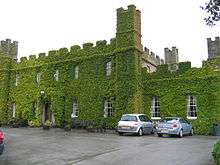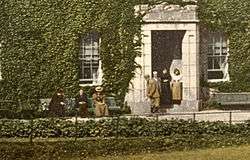Tregenna Castle

Tregenna Castle, in St Ives, Cornwall, was built by John Stephens in the 18th century. The estate was sold in 1871 and became a hotel, a purpose for which it is still used today.
The castle is a Grade II Listed building.[1] It is surrounded by 72 acres (29 ha) of gardens and natural woodland,[2] and has views along the coastline of Cornwall.
History
Tregenna Castle was built in 1774 by Samuel Stephens a member of an important local family. (The architect was probably John Wood, the Younger.) The building was extended in the 19th century. The estate was put up for sale by auction on 31 October 1871. The castle – an imposing castellated edifice, very substantially built of granite – at this time included three pairs of bedrooms on the upper floor and another bedroom on the ground floor; a school room; billiard room; WCs; and servants' quarters in the basement. The sale included the park, lodge, glen, pasture grounds, gardens, woods, plantations, and lands in hand 90 Acres, 1 Rood, 20 Perches.[3]
Railway hotel

The Great Western Railway (GWR) opened its St Ives branch line on 1 June 1877[4] and it leased the Tregenna Castle as a hotel the following year, opening it on 5 August 1878. Early railway hotels had only been situated near large terminals or junctions, but this one was the first intended by the GWR as a holiday destination in its own right.[5]
Sir Daniel Gooch, the chairman of the GWR, stayed at the hotel a few weeks after it opened to the public. He recorded in his diary that
- the situation of this house is very fine; it is a castle within its own grounds of about 70 acres (28 ha), a great part of which are gardens and woods with pretty shaded walks ... The house feels more like a private house than a hotel; the views from it are very fine, looking over the town and bay of St Ives and along the coast as far as Trevose Head.[6]
The GWR purchased the hotel outright in 1895.[5]
One of the GWR's buses, a 1.5 ton Milnes-Daimler type, was stationed at the hotel from 1913 to convey residents to the golf links at Lelant but the service was suspended in 1916 due fuel shortages during World War I. It was replaced in 1922 by a new bus on a Burford chassis. This operated for seven years until the arrival of a new Thornycroft bus with a Duple body in 1929.[7]
The Great Western Railway named two of its express locomotives after the hotel:[8]
- Duke Class number 3280 carried the name "Tregenna" from 1897 to 1930.
- Castle Class number 5006 was given the name "Tregenna Castle" in 1927.
Subsequently
The GWR was nationalised to become the Western Region of British Railways on 1 January 1948. Railway hotels throughout the United Kingdom eventually became the British Transport Hotels division but they were all privatised during the 1980s. The hotel and grounds are currently managed by the Tregenna Castle Estate.
References in popular culture
The English guitarist and composer Anthony Phillips was a frequent visitor to St Ives with his family in the late 1960s and early 1970s,[9] and in 1972 composed a guitar duet entitled "Tregenna Afternoons". Phillips recorded the piece in 1976, and it was released on his 1979 album Private Parts and Pieces.
Blackhurst Estate, one of the settings in the 2008 novel The Forgotten Garden by Australian author Kate Morton, is rumored to be loosely based upon Tregenna Castle with the fictional village of Tregenna; which sits under Blackhurst, to be a fictional version of St Ives.
References
- ↑ English Heritage. "Listed Buildings in Penwith" (PDF). Penwith District Council. p. 65. Archived from the original (PDF) on May 3, 2006. Retrieved 2008-04-25.
- ↑ Treganna Castle Estate website (accessed 2008-04-22)
- ↑ Parsons, Rick (2003). "The Tregenna Castle Estate Sale Particulars". West Penwith Resources. Retrieved 2008-08-14.
- ↑ Jenkins, Stanley C (1992). "The St Ives Branch". Great Western Railway Journal (Wild Swan Publications Ltd) (Late Summer 1992): 2–34.
- 1 2 MacDermot, E T (1931). History of the Great Western Railway, volume II 1863-1921. London: Great Western Railway.
- ↑ Diary of Sir Daniel Gooch, quoted in Jenkins (1992)
- ↑ Cummings, John (1980). Railway Motor Buses and Bus Services in the British Isles 1902-1933 (Volume 2). Oxford: Oxford Publishing Company. ISBN 0-86093-050-5.
- ↑ Pike, Jim (2000). Locomotive Names. Stroud: Sutton Publishing. ISBN 0-7509-2284-2.
- ↑ Johnson, Robin (2004). "Anthony Phillips: Chief Librarian". Record Collector. Retrieved 2010-06-30.
Coordinates: 50°12′16″N 5°28′40″W / 50.20446°N 5.47785°W